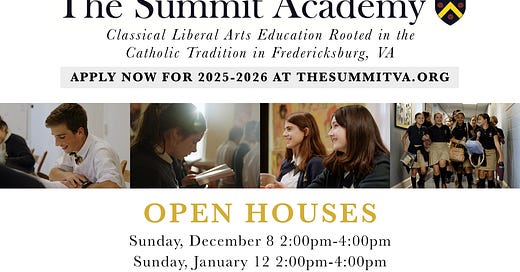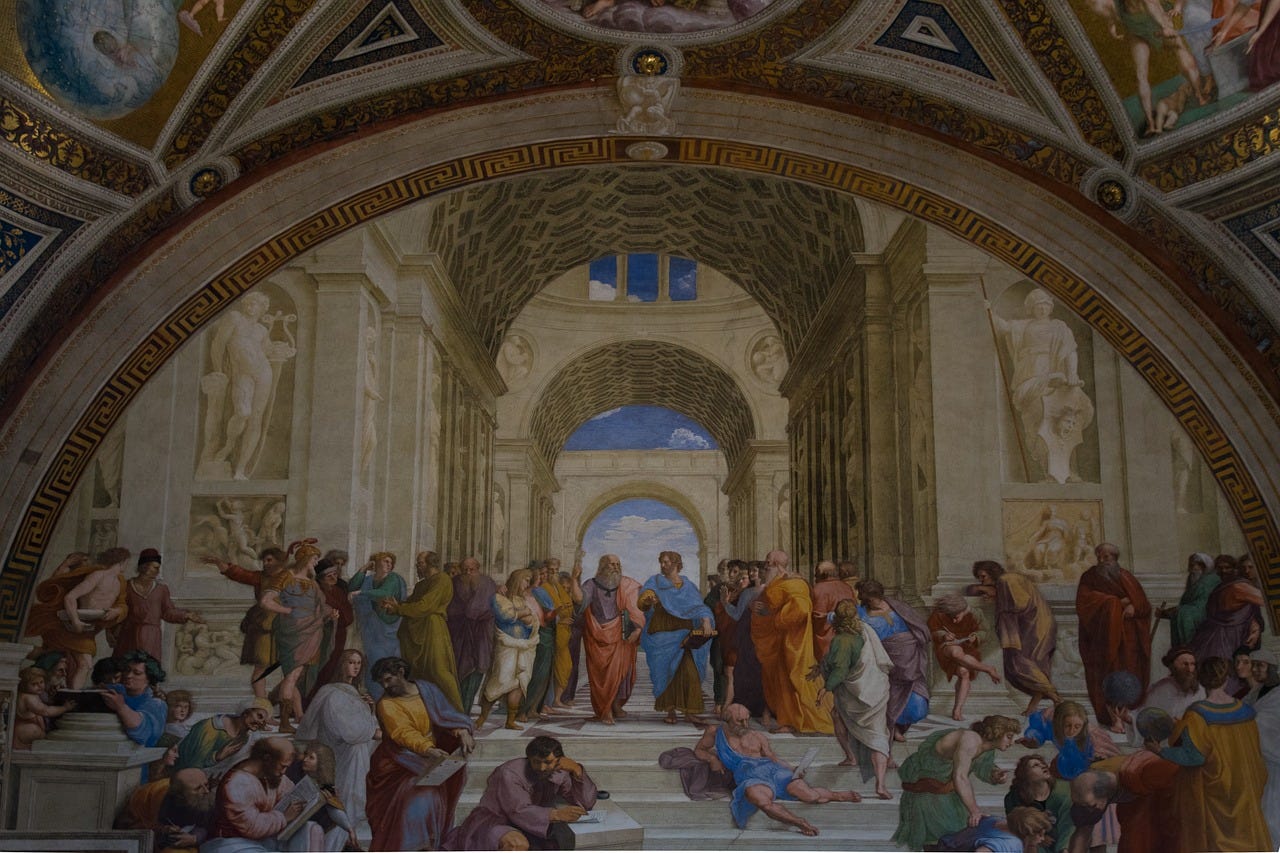Post XV: The Summit's Growing Reputation
A news feature, year-end events, and the return of faculty insights
The Summit Academy is a classical liberal-arts school rooted in the Catholic tradition, located in historic Fredericksburg, Va., serving students in grades 6-12. This newsletter informs readers about our school and the ways in which it is helping renew education and the Church.
Happy feast of St. Nicholas, the famous bishop of Myra. In this update, we share our upcoming open house dates, recent news profiles of The Summit Academy, a preview of year-end events, and a new column in the Faculty Insight section.
News Coverage of The Summit
In late October, the Fredericksburg Free Press highlighted The Summit’s special-use permit approval. Just a few weeks ago, the outlet’s business correspondent—longtime Fredericksburg economic development chief Bill Freehling—visited campus for a sit-down interview and tour with school leadership.
Within the context of increasing private-school enrollment across the region, Freehling wanted to find out what independent schools are doing right. Over the course of several hours, we discussed The Summit’s vision for education, the founding story, and our strategic plan for growth, and visited several classrooms to witness the curriculum in action.
I’d encourage you to read the entire profile, which captures the methods and aims of a Summit education:
Instead of teaching students to memorize facts and regurgitate them on tests, Summit uses the Socratic method to teach critical thinking. That means students are often at the helm of classroom discussions, while teachers subtly steer the ship.
The curriculum is integrated, teaching students to see connections between disciplines including Math, Science, History, Art, Logic, Philosophy and Literature. Students study Latin and Theology, the Old and New Testaments, and a large volume of primary texts.
. . . Summit is not re-inventing the education wheel but rather returning to the classic methods started by the ancient Greeks, said Director of Curriculum and Faculty Evan Williams. Students are encouraged to think, offer insights, take risks and be willing to make mistakes.
One can imagine why an educational and school culture such as this one is so attractive to parents in the region. Crucial to our success as a community and as a nation are our abilities to exercise freedom responsibly and engage with one another charitably, and these skills are exactly what students are learning.
Upcoming Open Houses: Dec. 8, Jan. 12
A note for existing families: We encourage you to share this promotional material and the open house link with prospective parents.
Year-End Events:
In addition to admissions open houses, we have hosted several college visits, including from the University of Austin (UATX), a start-up liberal arts college featured on 60 Minutes. The school’s goal? To creatively disrupt higher education by creating a culture of truth-seeking.
In addition to student-led festivities throughout December, The Summit is hosting two notable events on Friday, December 13. The first is a lunchtime lecture on the Electoral College by Michael Maibach, a trustee at the James Wilson Institute and a former Intel executive. The first of its kind, this student-focused lecture will help prepare students for college, where they will find many such events. Guest lectures at The Summit serve to enhance the intellectual life of the school and contribute to a culture of rigorous academic inquiry.
The second event is our first-ever winter drama program, an interactive murder mystery based on It’s a Wonderful Life. Attendees will enjoy dinner, drinks, and the chance to solve a case. Tickets are limited so secure yours using this link today.
Faculty & Curriculum Insight: Is the Intellectual Life Optional?
A reader favorite, this section is a place for faculty to share reflections from the classroom. This edition’s faculty insight is from Mr. Julian Sicam, a second-year instructor who also serves as admissions and college guidance counselor. Mr. Sicam arrived at The Summit in August 2023 after having served as headmaster at a Catholic classical school in the Midwest. A graduate of Benedictine College, Mr. Sicam is pursuing a doctorate through the Center for Thomistic Studies at University of St. Thomas–Houston.
A number of years ago I was introduced to someone at a party who asked me what I study. “Philosophy,” I replied. “Oh,” she said, eyebrows raised. Her polite nods and filler words betrayed her inner panic as she scrambled for something to say. Eventually she decided to introduce me to someone else. “This is Julian,” she said. “He studies psychology.”
I share this experience, the general form of which has become all-too familiar to me, not to fish for pity, nor to embarrass either the otherwise sweet middle-aged lady referred to in the anecdote or any reader who knows he would react the same way, but rather to provide a lighthearted example of the impression I know people have of the kind of work I do and the kind of life I live outside of the school. I am under no illusions about the cloud of mystery that may surround the word philosophy; or, if there be no such cloud, what strange and ominous notions arise at its mention; and, furthermore, perhaps how even more mysterious and more strange the man must be who dedicates his life to such a thing.
Well—regardless of what my students may tell you—I am, in fact, as normal as the next guy. At least I try to be. But I would add that philosophy is, in a certain sense, even more normal than the next guy. If there are any who would react with surprise at the idea of living a life pursuing something as surely esoteric and useless as philosophy, I would respond that I would be more surprised to find anyone who has never done philosophy in some form or other.
Aristotle, the Philosopher par excellence, once famously said, “All men by nature desire to know.” Such a bold statement tempts scoff. “What about my Uncle So-and-so? He never seems to want to know anything at all.” Well, what Aristotle means here is something extremely fundamental: if you have ever correctly and meaningfully used the word “because,” you have done philosophy. That’s all it comes down to. Philosophy, in a broad sense, is simply the pursuit of the reasons for things. And as I am suggesting, everyone has sought a reason for something at some point—even Uncle So-and-so. For in seeing the reason for something, we are said to know it; and so a search for reasons, any at all, is a search for knowledge.
All I do in my studies, then, is summarized in the rhetorical question of Ralph McInerny: “Wouldn’t it be better and more salutary to regard philosophy as the attempt to do well what we can scarcely help doing one way or the other if we are men at all?” If the reader can see the ubiquity of philosophy, it should be a short step to seeing the wisdom of Aristotle’s statement, and in particular the phrase, “by nature.” Not only do men want to know things, to seek after the reasons or causes for things, but to do so is built into who we are.
We can grasp the reasons for things, and we seek them out habitually. But the power by which we do this, aptly named, is reason. What must make us happy, then, is the activity of reason.
But we ought also to see the wisdom in the other word he uses: “Desire.” A question we tend to ask ourselves perhaps less often than we should is What do I really want most? Questions such as these have a penchant for finding themselves on the backburner, much like a teapot, and unless they’re given answers they likewise begin to ring in the background. For the prerequisite self-reflections are seldom easy. But if our lives are to have any real meaning, should we not aim them at the things that are most important? And how are we to know what those things are unless we address such questions?
Furthermore, and most germane to our present topic, what kind of audacity would possess Aristotle to say that what we all want is knowledge? Although I can’t speak for the dead, I’m nonetheless confident he would see this objection coming. For in another work he asks the same question we are posing now, but universalized—Is there something that all men desire?—and his answer there is noticeably different: it is happiness. All our choices, all our quotidian decisions, are aimed, whether consciously or not, at happiness. But happiness is a very vague and confused notion. So after sorting through various ideas of it and cutting through arguments for why it is not found in things like honor or money, Aristotle lands on the idea that what happiness truly consists of hinges on the kind of thing we are, on human nature, and that we are only really happy when we are doing well as humans, as what we are.
So what are we? Are we like plants, who can only nourish ourselves and grow? Are we like animals, whose cognitive abilities are limited to the powers of sense? We can do better. Unlike them, we are capable of knowing, in the fullest sense. We can grasp the reasons for things, and we seek them out habitually. But the power by which we do this, aptly named, is reason. What must make us happy, then, is the activity of reason.
My title is suggestive, and may provoke many thoughts. Perhaps it sounds like a command in the form of a rhetorical question, evoking fear and intimidation. Though it is rhetorical, I only mean, not to daunt, but to exhort. For as I hope I’ve shown, it behooves us, for our own happiness, to sharpen and hone our powers of reason, to seek to do well what we can scarcely help doing one way or another if we are men at all. Strange indeed the man who willingly takes up the moniker “philosopher.” But stranger is he who has never once philosophized—strange, and unhappy, if he refuses to do so.
What I’m Reading Now
Check out Cardinal Thomas Collins’s reflection “Pursuing Holy Wisdom” at What We Need Now, a great Substack. During this time of preparation, we remember that wisdom is found in humility—the kind of humility that Christ embodied when He came to Earth as a baby.
Also, I recommend Yuval Levin’s reflection on “Gratitude in an Angry Time” published at Public Discourse. Levin served in the Bush White House and now directs the program on Social, Cultural, and Constitutional Studies at the American Enterprise Institute.
Finally, every Advent, it’s worth revisiting the Gospel accounts of Christ’s birth in quiet, in prayer, and in full. You will surely hear them at mass, but nothing will be as fruitful as spending time contemplating the Word itself.
If you are enjoying this newsletter, please consider subscribing via the button above and sending it along to others who might be interested. Revenue from paid subscriptions will support The Summit Academy of Central Virginia.






